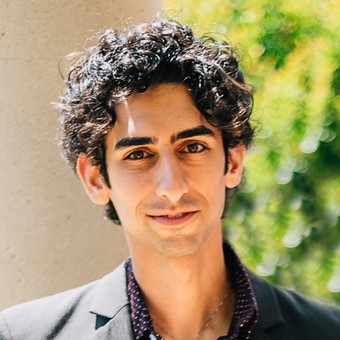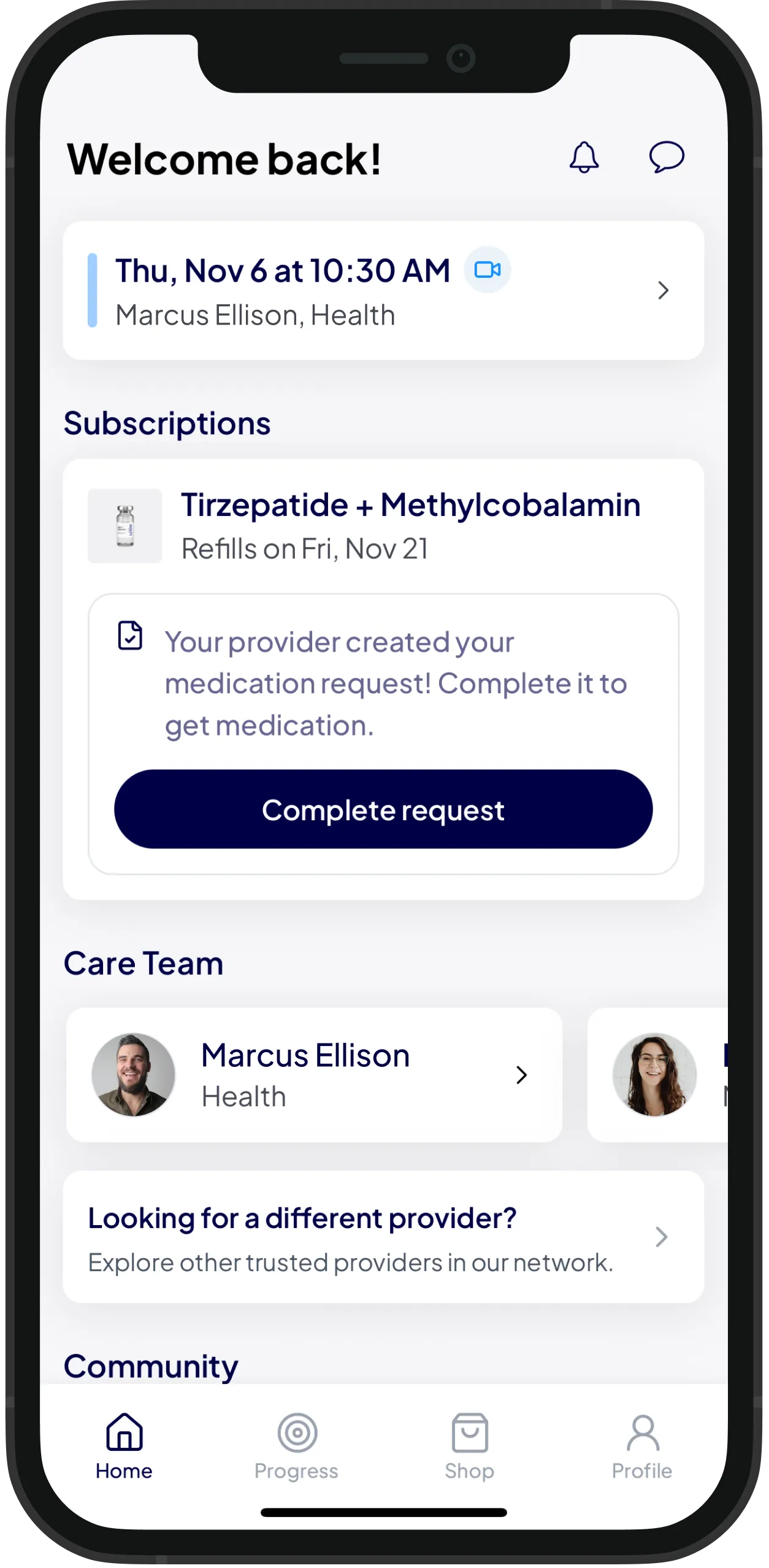Ready to transform your health?
Unlock access to expert guidance and a weight care plan crafted just for you.
Similar Articles
Similar Articles

How to Spot Fake Semaglutide: Safety Risks and Warning Signs
How to Spot Fake Semaglutide: Safety Risks and Warning Signs

Alternatives to BMI: Better Ways to Measure Health
Alternatives to BMI: Better Ways to Measure Health

Is Zofran Safe with Semaglutide? What You Need to Know
Is Zofran Safe with Semaglutide? What You Need to Know
How to Avoid Gaining Weight After Stopping GLP-1s?
Maintaining weight loss after stopping a medication like GLP-1 can be challenging, but with the right strategies and support, you can achieve lasting success. In this article, we’ll learn how to avoid gaining weight after stopping GLP-1. Explore tips for diet, exercise, and support strategies to help maintain weight loss success.

Table of Contents
Table of Contents
How Do GLP-1s Work?
How Much Weight Do Most People Lose on GLP1s?
How Common is Weight Regain on GLP1s?
How to Avoid Regaining Weight After Stopping GLP1s?
When to Contact a Doctor About Restarting a GLP1?
How Mochi Health Supports Our Patient's Weight Loss Journey
How Do GLP-1s Work?
How Much Weight Do Most People Lose on GLP1s?
How Common is Weight Regain on GLP1s?
How to Avoid Regaining Weight After Stopping GLP1s?
When to Contact a Doctor About Restarting a GLP1?
How Mochi Health Supports Our Patient's Weight Loss Journey
How Do GLP-1s Work?
At Mochi, we offer both brand-name and compounded GLP-1 medications to support safe, effective weight management. GLP-1s are a class of medications originally developed to help manage type 2 diabetes, but they have also become widely used for weight loss because of how they work in the body.
GLP-1 medications mimic a natural hormone in your body called glucagon-like peptide-1. This hormone plays a key role in regulating appetite, digestion, and blood sugar. By activating GLP-1 receptors, these medications help:
Slow gastric emptying, so food stays in your stomach longer
Increase feelings of fullness, making it easier to reduce portion sizes
Stabilize blood sugar levels, helping prevent cravingsReduce appetite overall
Whether brand-name or compounded, GLP-1 medications support weight loss by helping people feel satisfied with less food, ultimately reducing calorie intake in a controlled, sustainable way
How Much Weight Do Most People Lose on GLP-1s?
Clinical trials and real-world evidence indicate that individuals using a GLP-1 ( semaglutide or tirzepatide) for weight management can lose a significant amount of weight. The STEP 1 Trial specifically investigated the efficacy of semaglutide, the active ingredient in Ozempic, for treating obesity in non-diabetic adults. (1) Eligible participants were at least 18 years old, had previously struggled with weight loss, and had a BMI ≥ 30 or higher, or a BMI ≥ 27 with associated weight-related health issues such as high blood pressure or heart disease.
During the 68-week study, one group received semaglutide through a weekly pen injection, while the other group was given a placebo. All participants followed a calorie-restricted diet, engaged in 150 minutes of physical activity each week, and had regular consultations with healthcare professionals to hold them accountable. The results showed that those using semaglutide achieved an average weight loss of 14.9%, compared to just 2.4% in the placebo group. This tells us that medications, like GLP-1, are highly effective at helping individuals lose weight. As you can see from the figure below, weight loss is quite substantial throughout the first year before beginning to plateau. As the weight loss comes to a halt, individuals may decide to go off the medication.

How Common is Weight Regain on GLP-1s?
Weight regain after discontinuing a GLP-1 is not uncommon, as the medication’s appetite-suppressing effects diminish once it's stopped. Research suggests that without the medication or sustaining proper lifestyle changes, individuals may regain some of the weight they lost. In fact, one study showed that just one year after stopping once-weekly semaglutide (2.4 mg) and lifestyle intervention, participants regained approximately two-thirds of the weight they had previously lost. (3)
Participants in this trial were originally part of the STEP 1 trial, and as such had been incorporating lifestyle interventions while on weekly semaglutide for 68 weeks. This group of 327 participants had experienced an average weight loss of approximately 17%. Following treatment withdrawal, participants regained an average of 12% of their body weight back within a year.
This underscores the importance of adopting sustainable habits for long-term weight maintenance. Many experts even recommend planning to stay on the medication long-term to maintain improvements in health and weight loss.
How to Avoid Regaining Weight After Stopping GLP-1s?
To minimize the risk of regaining weight, consider the following strategies:
Adopt a Balanced Diet: Focus on whole foods, including fruits, vegetables, lean proteins, and whole grains. Reducing calorie-dense and processed foods can help maintain weight loss. Tracking calories is essential to maintain your weight loss efforts, especially as your appetite will increase after discontinuing any medication used for appetite suppression. Talking with your nutritionist to establish your maintenance calories can help maintain your weight loss.
Stay Active: Regular physical activity is crucial for weight maintenance. Aim for at least 150 minutes of moderate-intensity exercise per week, such as walking, cycling, or swimming.
Monitor Your Progress: Keeping track of your calorie intake, physical activity, and weight is essential to stay accountable and make adjustments as needed.
Prioritize Sleep and Stress Management: Adequate sleep and stress reduction can support hormonal balance and prevent weight regain.
Seek Professional Support: Consider working with a dietitian or a weight loss coach to develop a personalized diet and exercise plan tailored to your needs.
When to Contact a Doctor About Restarting a GLP-1?
If you notice significant weight regain or struggle to manage your weight without medication, it may be time to consult your healthcare provider. Obesity is a chronic condition that may require ongoing treatment. Talk with your doctor about your options and remember: you are not alone. Your doctor will be able to help assess your situation and determine whether restarting GLP-1s or exploring other weight management options is appropriate.
How Mochi Health Supports Our Patient's Weight Loss Journey
At Mochi Health, we are dedicated to helping you achieve and maintain your weight loss goals. Our approach includes:
Personalized Treatment Plans: We craft individualized plans that align with your unique health needs and lifestyle.
Comprehensive Support: Our team of healthcare providers and dietitians offers guidance and encouragement throughout your journey.
Regular Monitoring: We provide ongoing evaluations to ensure your weight management plan is effective and adjust it as necessary.
Maintaining weight loss after stopping a GLP-1 requires commitment and effort, but with the right strategies and support from Mochi Health, you can achieve lasting success. By focusing on healthy habits and staying informed about your options, you can continue to thrive on your weight management journey. Learn more about if you’re eligible to join Mochi Health today.
Resources
Wilding JP, Batterham RL, Calanna S, et al.: Once-weekly semaglutide in adults with overweight or obesity. N Engl J Med. 2021, 384:989-1002. https://www.nejm.org/doi/10.1056/NEJMoa2032183
Food and Drug Administration. GLP-1 (semaglutide) injection prescribing information, revised 2020. https://www.accessdata.fda.gov/drugsatfda_docs/label/2020/209637s003lbl.pdf
Wilding JPH, Batterham RL, Davies M, Van Gaal LF, Kandler K, Konakli K, Lingvay I, McGowan BM, Oral TK, Rosenstock J, Wadden TA, Wharton S, Yokote K, Kushner RF; STEP 1 Study Group. Weight regain and cardiometabolic effects after withdrawal of semaglutide: The STEP 1 trial extension. Diabetes Obes Metab. 2022 Aug;24(8):1553-1564. doi: 10.1111/dom.14725. Epub 2022 May 19. PMID: 35441470; PMCID: PMC9542252. https://www.ncbi.nlm.nih.gov/pmc/articles/PMC9542252/
How Do GLP-1s Work?
At Mochi, we offer both brand-name and compounded GLP-1 medications to support safe, effective weight management. GLP-1s are a class of medications originally developed to help manage type 2 diabetes, but they have also become widely used for weight loss because of how they work in the body.
GLP-1 medications mimic a natural hormone in your body called glucagon-like peptide-1. This hormone plays a key role in regulating appetite, digestion, and blood sugar. By activating GLP-1 receptors, these medications help:
Slow gastric emptying, so food stays in your stomach longer
Increase feelings of fullness, making it easier to reduce portion sizes
Stabilize blood sugar levels, helping prevent cravingsReduce appetite overall
Whether brand-name or compounded, GLP-1 medications support weight loss by helping people feel satisfied with less food, ultimately reducing calorie intake in a controlled, sustainable way
How Much Weight Do Most People Lose on GLP-1s?
Clinical trials and real-world evidence indicate that individuals using a GLP-1 ( semaglutide or tirzepatide) for weight management can lose a significant amount of weight. The STEP 1 Trial specifically investigated the efficacy of semaglutide, the active ingredient in Ozempic, for treating obesity in non-diabetic adults. (1) Eligible participants were at least 18 years old, had previously struggled with weight loss, and had a BMI ≥ 30 or higher, or a BMI ≥ 27 with associated weight-related health issues such as high blood pressure or heart disease.
During the 68-week study, one group received semaglutide through a weekly pen injection, while the other group was given a placebo. All participants followed a calorie-restricted diet, engaged in 150 minutes of physical activity each week, and had regular consultations with healthcare professionals to hold them accountable. The results showed that those using semaglutide achieved an average weight loss of 14.9%, compared to just 2.4% in the placebo group. This tells us that medications, like GLP-1, are highly effective at helping individuals lose weight. As you can see from the figure below, weight loss is quite substantial throughout the first year before beginning to plateau. As the weight loss comes to a halt, individuals may decide to go off the medication.

How Common is Weight Regain on GLP-1s?
Weight regain after discontinuing a GLP-1 is not uncommon, as the medication’s appetite-suppressing effects diminish once it's stopped. Research suggests that without the medication or sustaining proper lifestyle changes, individuals may regain some of the weight they lost. In fact, one study showed that just one year after stopping once-weekly semaglutide (2.4 mg) and lifestyle intervention, participants regained approximately two-thirds of the weight they had previously lost. (3)
Participants in this trial were originally part of the STEP 1 trial, and as such had been incorporating lifestyle interventions while on weekly semaglutide for 68 weeks. This group of 327 participants had experienced an average weight loss of approximately 17%. Following treatment withdrawal, participants regained an average of 12% of their body weight back within a year.
This underscores the importance of adopting sustainable habits for long-term weight maintenance. Many experts even recommend planning to stay on the medication long-term to maintain improvements in health and weight loss.
How to Avoid Regaining Weight After Stopping GLP-1s?
To minimize the risk of regaining weight, consider the following strategies:
Adopt a Balanced Diet: Focus on whole foods, including fruits, vegetables, lean proteins, and whole grains. Reducing calorie-dense and processed foods can help maintain weight loss. Tracking calories is essential to maintain your weight loss efforts, especially as your appetite will increase after discontinuing any medication used for appetite suppression. Talking with your nutritionist to establish your maintenance calories can help maintain your weight loss.
Stay Active: Regular physical activity is crucial for weight maintenance. Aim for at least 150 minutes of moderate-intensity exercise per week, such as walking, cycling, or swimming.
Monitor Your Progress: Keeping track of your calorie intake, physical activity, and weight is essential to stay accountable and make adjustments as needed.
Prioritize Sleep and Stress Management: Adequate sleep and stress reduction can support hormonal balance and prevent weight regain.
Seek Professional Support: Consider working with a dietitian or a weight loss coach to develop a personalized diet and exercise plan tailored to your needs.
When to Contact a Doctor About Restarting a GLP-1?
If you notice significant weight regain or struggle to manage your weight without medication, it may be time to consult your healthcare provider. Obesity is a chronic condition that may require ongoing treatment. Talk with your doctor about your options and remember: you are not alone. Your doctor will be able to help assess your situation and determine whether restarting GLP-1s or exploring other weight management options is appropriate.
How Mochi Health Supports Our Patient's Weight Loss Journey
At Mochi Health, we are dedicated to helping you achieve and maintain your weight loss goals. Our approach includes:
Personalized Treatment Plans: We craft individualized plans that align with your unique health needs and lifestyle.
Comprehensive Support: Our team of healthcare providers and dietitians offers guidance and encouragement throughout your journey.
Regular Monitoring: We provide ongoing evaluations to ensure your weight management plan is effective and adjust it as necessary.
Maintaining weight loss after stopping a GLP-1 requires commitment and effort, but with the right strategies and support from Mochi Health, you can achieve lasting success. By focusing on healthy habits and staying informed about your options, you can continue to thrive on your weight management journey. Learn more about if you’re eligible to join Mochi Health today.
Resources
Wilding JP, Batterham RL, Calanna S, et al.: Once-weekly semaglutide in adults with overweight or obesity. N Engl J Med. 2021, 384:989-1002. https://www.nejm.org/doi/10.1056/NEJMoa2032183
Food and Drug Administration. GLP-1 (semaglutide) injection prescribing information, revised 2020. https://www.accessdata.fda.gov/drugsatfda_docs/label/2020/209637s003lbl.pdf
Wilding JPH, Batterham RL, Davies M, Van Gaal LF, Kandler K, Konakli K, Lingvay I, McGowan BM, Oral TK, Rosenstock J, Wadden TA, Wharton S, Yokote K, Kushner RF; STEP 1 Study Group. Weight regain and cardiometabolic effects after withdrawal of semaglutide: The STEP 1 trial extension. Diabetes Obes Metab. 2022 Aug;24(8):1553-1564. doi: 10.1111/dom.14725. Epub 2022 May 19. PMID: 35441470; PMCID: PMC9542252. https://www.ncbi.nlm.nih.gov/pmc/articles/PMC9542252/
Read next
Ready to transform your health?
Unlock access to expert guidance and a weight care plan crafted just for you.

Ready to transform your health?
Unlock access to expert guidance and a weight care plan crafted just for you.

Ready to transform your health?
Unlock access to expert guidance and a weight care plan crafted just for you.


© 2026 Mochi Health
All professional medical services are provided by licensed physicians and clinicians affiliated with independently owned and operated professional practices. Mochi Health Corp. provides administrative and technology services to affiliated medical practices it supports, and does not provide any professional medical services itself.


© 2026 Mochi Health
All professional medical services are provided by licensed physicians and clinicians affiliated with independently owned and operated professional practices. Mochi Health Corp. provides administrative and technology services to affiliated medical practices it supports, and does not provide any professional medical services itself.


© 2026 Mochi Health
All professional medical services are provided by licensed physicians and clinicians affiliated with independently owned and operated professional practices. Mochi Health Corp. provides administrative and technology services to affiliated medical practices it supports, and does not provide any professional medical services itself.

















